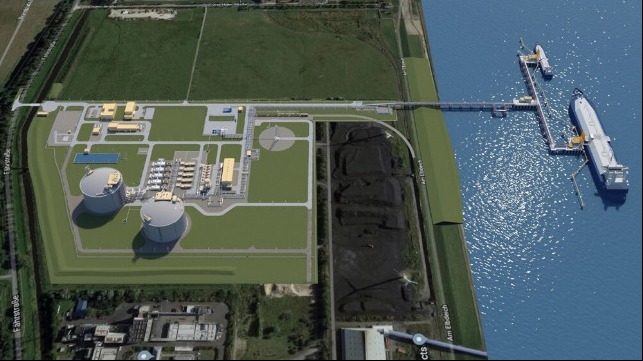RWE Adds Ammonia to Germany’s First LNG Import Terminal

Under pressure to find new sources of energy to reduce its dependence on Russian energy, Germany is moving to accelerate projects that would permit the country to import new forms of energy. Recently, the government announced it would participate in the country’s first LNG import terminal to fast track the project, and now energy giant RWE is propping to add a green element to prepare the project for the long term. RWE plans to invest in a terminal for the import of ammonia near the LNG terminal that could in the future be merged to form a green energy hub.
“Russia’s brutal war against Ukraine has made it abundantly clear that we must become independent of fuel imports from Russia. The LNG terminal in Brunsbüttel is an important element in this, as it will increase the capabilities to import gas to Germany,” said Robert Habeck, the Federal Minister for Economic Affairs and Climate Action.
RWE announced that it expects investments in “the mid-three-digit million euro range” to build an ammonia terminal near the site of the LNG terminal in Brunsbüttel. According to the company from as early as 2026, it will be possible to import around 300,000 tonnes of green ammonia per year to Germany via the terminal and be distributed to customers. The next step would be to build a cracker on a large industrial scale at the terminal to produce green hydrogen on-site as well. This will then be transported to industrial customers via a dedicated hydrogen pipeline.
“Green ammonia as a liquefied hydrogen derivative can make an important contribution to supplying Germany with green hydrogen. At the same time, we can gain important experience with this project for the conversion from LNG to green hydrogen or hydrogen derivatives,” said minister Habeck.
RWE said it is committing to green ammonia as the most competitive hydrogen derivative with the highest level of technological maturity. The project is intended to help facilitate the subsequent conversion of the entire site ready to import green molecules. As a shareholder in the LNG terminal, they believe the opportunity exists for Brunsbüttel to become a role model for the decarbonization of industrial society.
“It is now more important than ever to think of climate protection and security of supply as one,” said
Markus Krebber, CEO of RWE. “That’s what we are doing. On the one hand, we are involved in the forthcoming construction of the first LNG terminal in Germany. This flagship project will cover the entire value chain – from import to conversion, transport, and use by industrial customers. The entire site will benefit from this.”

that matters most
Get the latest maritime news delivered to your inbox daily.
An increase in the volume of ammonia to two million tonnes per year is also planned, placing the terminal at the beginning of a green import infrastructure. Due to its direct access to the North Sea and the Baltic Sea, and its connection to European inland waterways, RWE highlights that the Brunsbüttel site offers ideal logistical conditions for the project.
Brunsbüttel Ports is also supporting the project with space and as a logistics partner with port infrastructure to unload tankers.
